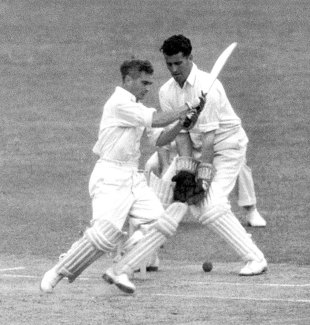Tony Pawson

|
|||
|
Related Links
Players/Officials:
Tony Pawson
Teams:
England
|
|||
PAWSON, HENRY ANTHONY, OBE, died on October 11, aged 91. Tony Pawson was one of the last of the brilliant all-round sportsmen who emerged from the public schools and bestrode English sport in the first half of the 20th century. He had a good war, became a successful cricketer and footballer, and world champion fly-fisherman; he later combined a career in business with journalism for The Observer and 14 books. Small and self-effacing almost to vanishing point, he would hardly be noticed amid the bustle of a press box. "Modesty" did not do his demeanour justice: Pawson exuded, if anyone cared to notice, a kind of serenity.
He was the son of Guy Pawson, who captained Oxford in 1910, then joined the Sudan Civil Service: the first fish Tony almost caught was a Nile perch so large it almost caught him. As a 15-year-old at Winchester, he made 237 in a colts match at Lord's, and in 1940 he emerged, said Wisden, as school cricket's "batsman of the year" - a cutter and hooker "with a vigilance in defence beyond his years". Thrust into the war, he was commissioned in the Rifle Brigade, attaining the rank of major, saw active service in Italy and North Africa, and was mentioned in despatches. His exploits included taking part in the bloody battle of Fondouk Pass in 1943, a tank attack he compared to the Charge of the Light Brigade. Once, a bullet passed through his forage cap. Having survived all that, he not surprisingly revelled in the joys of post-war cricket. However, his approach to sport, as well as his status, was amateur. Called up by Kent straight after demob in 1946, he made 90 on debut against Hampshire, and was soon given his cap and told by his captain Bryan Valentine he was in for the season. "Sorry, skipper, I'm off fishing," came the reply.
Pawson appeared intermittently, but often successfully, for Kent until 1953. His batting never lost its youthful vigour, and his nifty singles were much appreciated by the spectators (though not by some of the old pros). But his remark to Valentine set the tone: he had too much else to do. At first, this was university: he made 135 in the 1947 Varsity Match, and the following year emulated his father by captaining Oxford to victory at Lord's. Pawson was also a fine footballer - a Blue, an England amateur international, and an Olympian in 1948, before making two appearances for Charlton in the First Division in 1951-52. Asked if he might turn out occasionally, he agreed - assuming that meant the reserves - in return for tickets to the Christmas Day match against Spurs. At the game, the manager, Jimmy Seed, asked him if he fancied turning out on the wing in the return fixture next day. Advised merely to have a pre-match whisky to steady his nerves, he scored the winner. But his main football fame was as the speedy right-winger of the sensational Pegasus team of Oxbridge types that won the Amateur Cup in 1953.
On weekdays, Pawson rose to personnel director of Reed International. In 1968, however, he became cricket and football correspondent of The Observer. Although very part-time, he was game enough to head off from a Test and cover a First Division match immediately afterwards. His writing was elegant rather than glittering, but his work could reveal the competitive steel that underlay his bland persona and apparent dilettantism. For the Cricket Writers' Club collection of essays, Cricket Heroes, he chose Douglas Jardine. He explained: "Whatever your attitude to a game, if you play at any level, you should play to win, with every fibre of your being devoted to doing well." And Pawson lived up to his motto in 1984, becoming - at the age of 62 - the first Briton to win the world fly-fishing championship, catching 23 trout in three four-hour sessions on the River Tormes in Spain, the ultimate triumph for his understated skill and determination.

